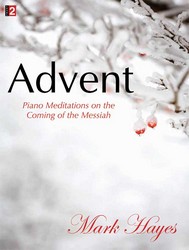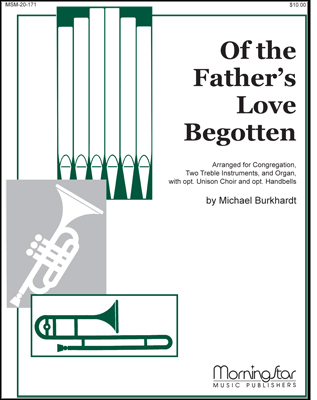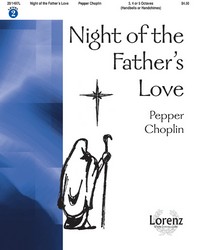- |
User Links
Of the Father's heart begotten Ere the world from chaos rose
Of the Father's heart begotten Ere the world from chaos rose
Author: Aurelius Clemens Prudentius; Translator: R. F. Davis (1906)Tune: DIVINUM MYSTERIUM
Published in 9 hymnals
Representative Text
1 Of the Father's heart begotten
ere the world from chaos rose,
he is Alpha: from that Fountain,
all that is and hath been flows;
he is Omega, of all things
yet to come the mystic Close,
evermore and evermore.
2 By his word was all created;
he commanded and 'twas done;
earth and sky and boundless ocean,
universe of three in one,
all that sees the moon's soft radiance,
all that breathes beneath the sun,
evermore and evermore.
3 He assumed this mortal body,
frail and feeble, doomed to die,
that the race from dust created
might not perish utterly,
which the dreadful Law had sentenced
in the depths of hell to lie,
evermore and evermore.
4 O how blest that wondrous birthday,
when the Maid the curse retrieved,
brought to birth mankind's salvation,
by the Holy Ghost conceived,
and the Babe, the world's Redeemer,
in her loving arms received,
evermore and evermore.
5 This is he, whom seer and sybil
sang in ages long gone by;
this is he of old revealèd
in the page of prophecy;
lo! he comes, the promised Saviour;
let the world his praises cry!
evermore and evermore.
6 Sing, ye heights of heaven, his praises;
Angels and Archangels, sing!
wheresoe'er ye be, ye faithful,
let your joyous anthems ring,
every tongue his name confessing,
countless voices answering,
evermore and evermore.
Source: Ancient and Modern: hymns and songs for refreshing worship #80
Author: Aurelius Clemens Prudentius
Marcus Aurelius Clemens Prudentius, "The Christian Pindar" was born in northern Spain, a magistrate whose religious convictions came late in life. His subsequent sacred poems were literary and personal, not, like those of St. Ambrose, designed for singing. Selections from them soon entered the Mozarabic rite, however, and have since remained exquisite treasures of the Western churches. His Cathemerinon liber, Peristephanon, and Psychomachia were among the most widely read books of the Middle Ages. A concordance to his works was published by the Medieval Academy of America in 1932. There is a considerable literature on his works. --The Hymnal 1940 Companion… Go to person page >Translator: R. F. Davis
Davis, Robert Furley, M.A., was born Jan. 22, 1866, at Nottingham, and educated at St. John's College, Cambridge (B.A. 1888, M.A. 1896). He is now (1906) senior classical master at Campbell College, Belfast, Ireland. He is the author of seven translations in The Hymns of Prudentius, Translated by B. Martin Pope and R. F. Davis, 1905, one of which is in The English Hymnal, 1906, No. 613. [Rev. James Mearns, M.A.] --John Julian, Dictionary of Hymnology, New Supplement (1907) Go to person page >Text Information
| First Line: | Of the Father's heart begotten Ere the world from chaos rose |
| Latin Title: | Corde natus ex parentis |
| Author: | Aurelius Clemens Prudentius |
| Translator: | R. F. Davis (1906) |
| Language: | English |
| Copyright: | Public Domain |
Tune
DIVINUM MYSTERIUMDIVINUM MYSTERIUM is a plainsong, or chant, associated with the “Divinum mysterium” text in manuscripts dating from the twelfth to fifteenth centuries. The tune was published in triple meter in Theodoricis Petri's Piae Cantiones (1582). Some hymnals retain the dance-like triple meter, while othe…
ALL SAINTS (Darmstadt)


 My Starred Hymns
My Starred Hymns







